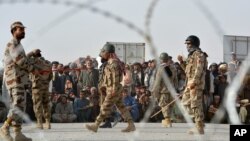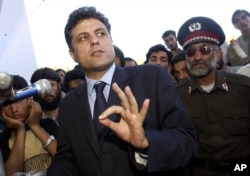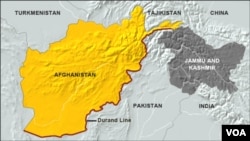Lawmakers in Afghanistan have called for stoning to death of a fellow parliament member for stating the country's long border with Pakistan is an international boundary.
Afghan commentators and newspaper editorials have also slammed the parliament member for speaking against "the national interest," with some demanding Abdul Latif Pedram's ouster from Wolesi Jirga, the lower house of parliament, for committing treason.
"You chant 'God is Great' through this microphone and I will stone him to death right here on the floor of this representative house," a member urged the house speaker while taking part in an evidently furious debate Monday.
The parliamentary proceedings were being televised live, as usual.
"For God's sake Mr. Speaker, if you don't take this action you will solely be held responsible," the angry lawmaker went on to warn Speaker Abdul Rauf Ibrahimi.
The punishment to the "spy," he said, will send a strong message to the people in Pakistan that any "agent" on Afghan soil will meet the same fate for even discussing the status of the Durand Line, the border between Afghanistan and Pakistan.
Pedram, head of his Afghanistan National Congress party, told a news conference in Kabul during the weekend that his party recognizes the Durand Line as the official border with Pakistan. He went on to say that most of the problems plaguing bilateral relations stem from Afghanistan's failure to publicly acknowledge it.
Pedram is an ethnic Tajik, who hails from the northeastern Afghan province of Badakhshan, and was a candidate in the October 2004 presidential election. He was present in the house during Monday's proceedings.
Taking part in the debate, another lawmaker condemned Pedram as ignorant of Afghan "sensitivities."
"I swear to God that, from today onward, if any will dare indulge in such illegal statements and debates about the Durand Line, the nation would break his jaw," he said.
Controversial Durand Line
Speaker Ibrahimi, while responding to the demands, reiterated the Durand Line is a national issue and "no individual, certain tribe or a specific group" can decide on its status. He emphasized that the authority to make any decision with regard to the frontier rests only with Afghanistan's traditional assembly of elders, called the Loya Jirga.
Afghan leaders, mainly ethnic Pashtuns, have from the outset disputed parts of the nearly 2,600-kilometer, largely porous border demarcated in 1893 during the British rule of the Indian subcontinent and named after the then-Foreign Secretary Mortimer Durand.
Pakistani officials dismiss Afghan objections and maintain their country inherited the international border after gaining independence from Britain in 1947.
Islamabad has lately stepped up efforts to fence off the Durand Line and has built new security outposts as well as forts along the border in addition to fortifying five regular crossings, despite protests from Kabul.
Officials in Pakistan defend the border management measures, saying they will help deter terrorist infiltrations in both direction.
Mutual allegations of sponsoring terrorist attacks against each other are at the center of recent tensions between Afghanistan and Pakistan.
"Pedram should be questioned inside the parliament as well as in the court of public opinion, because this is a vital matter for the Afghan territory and nation," wrote the Afghanistan Times newspaper in an editorial. "Statements in favor of recognition to the Durand Line as a permanent border with Pakistan would be an insult to our martyrs. Territorial history and integrity cannot be compromised at any cost," it added.






